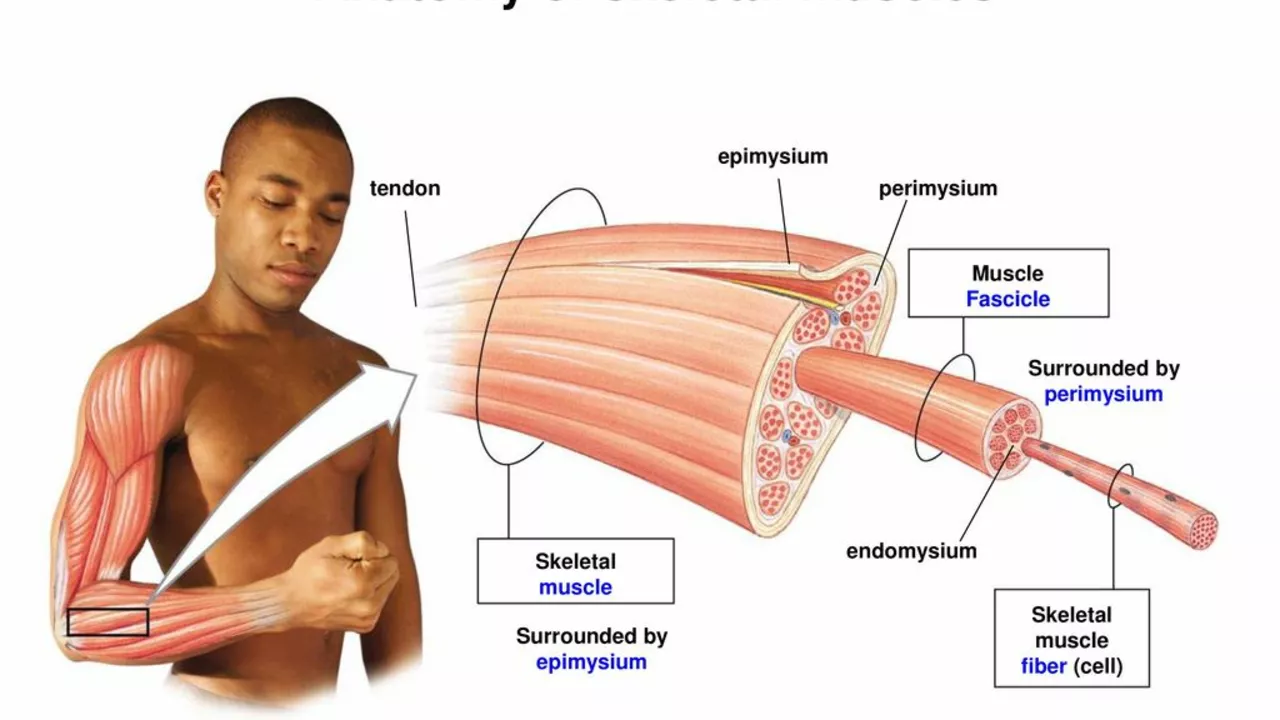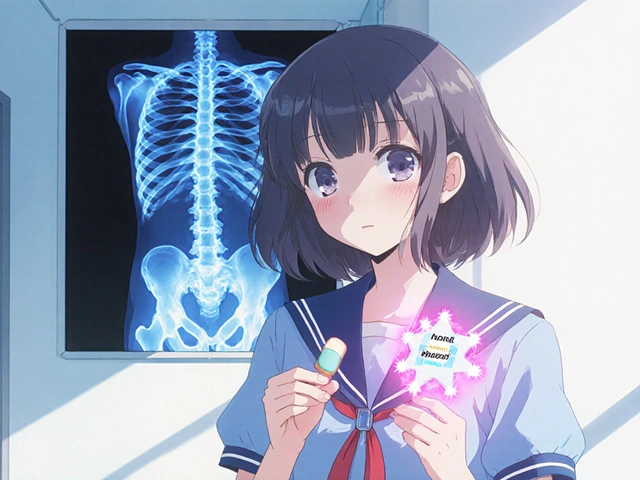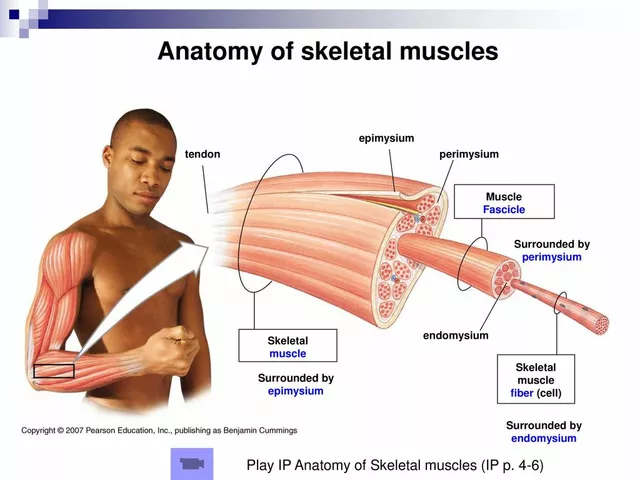Understanding Skeletal Muscle Conditions
Firstly, allow me to delve into the world of skeletal muscle conditions. When we talk about skeletal muscle conditions, we are referring to a broad spectrum of disorders that affect the muscle tissues in our bodies. These conditions can range from muscle atrophy, where the muscle tissue wastes away due to lack of use, to muscular dystrophy, a group of genetic diseases that cause progressive weakness and loss of muscle mass. Moreover, conditions like myopathy, which refers to diseases of the muscle tissue itself, or even conditions that affect the nerves controlling the muscles, like amyotrophic lateral sclerosis, come under the umbrella of skeletal muscle conditions.
It's essential to know that these conditions not only affect our muscles but also have a significant impact on our bone health. The connection between skeletal muscle conditions and bone health is a topic that is gaining increasing attention in the medical community, and for a good reason.
The Link Between Skeletal Muscle and Bone Health
Now, let's examine how skeletal muscle conditions are connected to bone health. Both skeletal muscles and bones are integral parts of our musculoskeletal system. They work in sync to provide our bodies with stability, enable movement, and protect our vital organs.
When skeletal muscle conditions occur, they can affect the way our muscles and bones interact. For instance, muscle atrophy can lead to decreased physical activity, which can, in turn, lead to bone loss. On the other hand, muscular dystrophy can cause abnormal bone development and increase the risk of fractures.
Moreover, research has shown that certain proteins and hormones that regulate muscle function also play a crucial role in bone metabolism. Therefore, any disruption in these can have a domino effect on both muscle and bone health.
Impact of Skeletal Muscle Conditions on Bone Density
Moving forward, let's discuss how skeletal muscle conditions can impact bone density. Bone density refers to the amount of bone mineral in bone tissue, and it's a crucial factor in determining the strength and health of our bones.
Skeletal muscle conditions can lead to decreased muscle mass and strength, and this decrease can lead to reduced physical activity. Reduced physical activity means less stress on our bones, and this lack of stress can cause our bones to lose density, making them weaker and more prone to fractures.
Additionally, certain skeletal muscle conditions can interfere with the regular bone remodeling process, causing an imbalance between bone formation and bone resorption, leading to a decrease in bone density.
Preventing Bone Health Deterioration in Skeletal Muscle Conditions
Now that we've understood the connection between skeletal muscle conditions and bone health, let's look at what we can do to prevent bone health deterioration in these conditions. Physical activity, especially weight-bearing exercises, is crucial to maintaining bone health. Despite the challenges posed by skeletal muscle conditions, engaging in safe and appropriate physical activities can help stimulate bone growth and slow down bone loss.
Moreover, maintaining a balanced diet rich in calcium and vitamin D can help support bone health. In some cases, medication may be necessary to slow down bone loss or promote bone growth.
It's important to remember that each individual is different and what works for one may not work for another. Therefore, it's vital to work with healthcare professionals to create a personalized plan to manage skeletal muscle conditions and maintain bone health.
The Future of Bone Health in Skeletal Muscle Conditions
Finally, let's look towards the future. With advancements in medical research, our understanding of the connection between skeletal muscle conditions and bone health is continually evolving. This knowledge is helping us to develop more effective treatments and interventions to manage these conditions and maintain bone health.
While the journey may be challenging, there is hope. By staying informed and proactive in managing our health, we can navigate through these conditions and work towards a healthier future.
Remember, our muscles and bones are interconnected parts of a complex system. A problem in one can affect the other. Therefore, it's not just about managing the skeletal muscle condition, but also about ensuring that our bones remain healthy and strong.










Sue Berrymore June 28, 2023
Imagine a future where every step you take not only powers your muscles but also strengthens the very framework that holds you upright. That's the promise when we tackle muscle atrophy head‑on with purposeful movement. Weight‑bearing exercise sends a clear signal to bone cells, urging them to lay down fresh mineral. Pair that with a diet rich in calcium and vitamin D, and you’re building a resilient architecture from the inside out. Keep pushing, stay consistent, and watch both muscle and bone thrive together.
Jeffrey Lee June 28, 2023
Muscle loss is jus a excuse for lazy americans.
Ian Parkin June 28, 2023
It is evident that sustained physical activity plays a pivotal role in preserving skeletal integrity. Moreover, systematic resistance training has been demonstrated to upregulate osteogenic pathways. Consequently, patients with muscular dystrophies may benefit from tailored exercise regimens. Let us therefore advocate for interdisciplinary collaboration to optimise outcomes for these individuals.
Julia Odom June 28, 2023
What a vibrant tapestry of science and hope you’ve painted! The interplay of muscle fibers and bone marbles feels like a well‑choreographed dance. A dash of creativity in rehab plans can truly spark lasting change.
Danielle Knox June 28, 2023
Oh sure, because everyone loves sitting on the couch and waiting for bones to crumble. Maybe try moving a little?
Mark Evans June 28, 2023
When we examine the cascade of events linking skeletal muscle health to bone density, several key mechanisms emerge that merit close attention. First, mechanical loading generated by muscle contractions delivers essential strain to bone, stimulating osteoblast activity and suppressing osteoclast-mediated resorption. In the absence of regular loading-such as in chronic muscle atrophy-this stimulus wanes, leading to an imbalance where bone breakdown outpaces formation. Second, the endocrine functions of muscle tissue, often referred to as the "myokine" network, release factors like irisin and myostatin that directly influence bone remodeling pathways. Elevated myostatin, for instance, has been correlated with reduced bone mineral density, while irisin appears to promote osteogenic differentiation. Third, nutritional status intertwines with both muscle and bone health; inadequate protein intake hampers muscle protein synthesis, which in turn diminishes the mechanical forces necessary for bone maintenance. Simultaneously, deficiencies in calcium and vitamin D compromise the mineral substrate required for robust bone matrix deposition. Fourth, inflammatory mediators that rise in many muscle disorders, such as TNF‑α and IL‑6, can accelerate bone loss by enhancing osteoclastogenesis. Managing systemic inflammation, therefore, becomes a crucial adjunct to preserving skeletal integrity. Fifth, neuromuscular coordination plays a subtle yet important role: when nerve signaling to muscle is disrupted, as seen in conditions like ALS, the resultant loss of coordinated movement further reduces effective loading on bone structures. Rehabilitation strategies that incorporate functional training can partially mitigate this effect by re‑engaging residual motor pathways. Finally, pharmacologic interventions-ranging from bisphosphonates to emerging sclerostin inhibitors-offer targeted means to bolster bone strength, especially when combined with tailored exercise programs that respect the limitations imposed by the underlying muscle condition. In practice, a multidisciplinary approach that couples physiotherapy, nutrition counseling, endocrine evaluation, and, when appropriate, medication, yields the best outcomes for patients navigating the dual challenge of muscle weakness and bone fragility. By addressing each of these domains, clinicians can help break the vicious cycle of disuse osteopenia and promote a healthier, more resilient musculoskeletal system.
Megan C. June 28, 2023
It is disheartening to see individuals neglect the moral responsibility they have toward their own bodies. Neglecting exercise and proper nutrition is not merely a personal choice; it reflects a broader disregard for health stewardship. We must encourage accountability and guide people toward disciplined, evidence‑based practices.